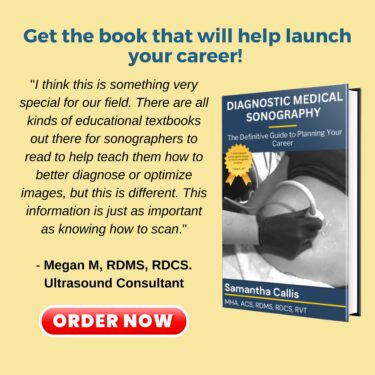Find New Hampshire’s Accredited Sonography Programs in 2024
Diagnostic medical sonographers play a vital role in the healthcare industry by providing images that help physicians detect, diagnose, and treat diseases through the use of ultrasound.
Sonography is becoming an increasingly popular career choice in part because of the potential for a high salary, the relatively short education and training period, and strong job growth. We will go into each of these topics below, as well as connect you with accredited ultrasound technician schools where you can receive the education you need to become a sonographer.
How to Become an Ultrasound Technologist in New Hampshire
- Choose the Right Program. There are many important factors to consider, and accreditation should be at the top of the list. If possible, apply to a program that has been accredited by the CAAHEP. That’s where you’ll get the best education.
- Get Your Degree. You’ll need to have an Associate of Science degree in DMS at a minimum. There are Bachelor’s Degree programs offered at some schools, as well as accelerated Certificate programs for those who meed the prerequisites.
- Pass the Certification Exam. Your employer will want you to have credentials from the ARDMS, and the only way to get that is to pass their exams. Graduating from a CAAHEP accredited program will meet one of the prerequisites and prepare you to take the test.
Connect with Educational Programs near You
Why Choose a CAAHEP Accredited Diagnostic Sonography Program?
 When a school or program becomes accredited, it means that they have been evaluated by an outside agency, and that the education they offer meets industry standards.
When a school or program becomes accredited, it means that they have been evaluated by an outside agency, and that the education they offer meets industry standards.
The most widely recognized organization that accredits sonography programs is the Commission on Accreditation of Allied Health Education Programs (CAAHEP). A school receives accreditation from CAAHEP once it has met their DMS Accreditation Standards and Guidelines. The school must also pass a series of program reviews, including a self-study review and a site visit. This makes sure that the school is able to provide a high quality education to their students so they’re prepared to enter the healthcare workforce.
Accredited Sonography Schools in New Hampshire in 2024
The school listed below offers the only CAAHEP accredited ultrasound program in the state as of October 2023:
| School | Programs Offered | Prerequisites | How to Apply |
|---|---|---|---|
| NHTI-Concord’s Community College 31 College Drive Concord, NH 03301 |
Professional Certificate in Diagnostic Medical Sonography | Allied Health Associate of Science or Bachelor’s of Science Degree | Begin the application process here. |
Ask an Expert
New Hampshire Scholarships and Awards
Below are just a few of the scholarships and awards available to those who qualify in New Hampshire:
| Scholarship | Award Amount | Eligibility Requirements | How to Apply |
|---|---|---|---|
| Ultrasound Schools Info | $1,000 | Aspiring sonographer currently enrolled in/accepted to a CAAHEP accredited DMS program. | Ultrasound Schools Info Attn: Scholarship Committee PO Box 3026 Bellingham, WA 98227 scholarship@ultrasoundschoolsinfo.com |
| ASRT Foundation Scholarships | Varies | A collection of scholarships available to ASRT members. Eligibility may vary. | ASRT Foundation 15000 Central Ave. SE Albuquerque, NM 87123-3909 USA 800-444-2778 foundation@asrt.org |
| Horatio Alger Association Career and Technical Scholarships | Up to $2,500 | Awarded to students who have overcome adversity and are pursuing a career or technical degree at an accredited non-profit institution. | Complete the application. |
| The New Hampshire Charitable Foundation | Varies | There are 451 different scholarships offered by this foundation, serving a variety of students. | Visit the foundation’s website to learn more. |
How Much do Ultrasound Techs Earn in New Hampshire?
The Bureau of Labor Statistics (BLS) states that the mean annual salary for sonographers working in New Hampshire in 2023 was $89,160, or $42.86 an hour (conditions in your area may vary). Ultrasound technologists at the top of their field (in the 90th percentile) earned a mean wage of $113,480 a year, while those in the bottom 10th percentile made up to $72,000. Job availability is expected to increase by 17% by 2030 (O*Net).
Where you work, amount of education, geographic location, and more can play a role in how much you can earn as a sonographer. For example, outpatient care centers tend to pay the most, though hospitals have the highest employment numbers. In addition, diagnostic medical sonography is one of the highest paying careers available with only an Associate Degree, and the industry is growing at a rapid pace. Earning a Bachelor’s Degree can open you up to higher paying positions as well.
Certification Requirements in New Hampshire
New Hampshire is the 4th state to require certification of its sonographers. To qualify for a New Hampshire sonography license, the New Hampshire Board of Medical Imaging and Radiation Therapy states that ultrasound techs practicing mammography, breast sonography, or bone density testing must possess licensure.
You can get certified by the American Registry of Radiologic Technologists (ARRT), Cardiovascular Credentialing International (CCI), or the American Registry for Diagnostic Medical Sonography (ARDMS).
For more information:
Board of Medical Imaging and Radiation Therapy
7 Eagle Square
Concord, NH 03301
(603) 271-8380
(603) 271-6702 (fax)
medimag.radtherapy@oplc.nh.gov
Additional Certification Information
Certification overview
About the ARDMS
Ultrasound Technician Schools in Manchester

According to CareerOneStop, the top two employers in the city are Elliot Hospital and Catholic Medical Center, which both offer great employment opportunities for sonographers. Manchester employed 60 sonographers in 2020, and jobs are expected to grow by 17% by 2030 state wide (O*Net). Completing a sonography program in the area will help make you a competitive candidate for these sought after positions.
Frequently asked questions
What does an ultrasound technician in New Hampshire do?
Sonographers do much more than just image internal organs. They also work closely with other members of the healthcare team and patients, and evaluate the images they capture. Learn more on our ultrasound technician career overview page. Get a complete job description, as well as first-hand accounts of what it’s like to be a sonographer.
How do I get started as a medical sonographer in New Hampshire?
We’ll walk you through all of the steps, starting when you’re still in high school or before you’ve started a formal post-education program, all the way through finding a job and advancing in your career. Get Started Now .
How long do I have to go to school?
Most degree programs are completed within two years, which will allow you to earn an Associate’s Degree, though program lengths may vary depending on particular program requirements. You can also go to school longer and receive a Bachelor’s or Master’s Degree, which will allow you to advance your career and increase your salary.
How do I know if sonography is right for me?
In order to be successful in the field, you’ll need more than just technical knowledge. Click here to find out about the qualities that make a great sonographer.
What other jobs can I get in healthcare?
There are many careers available within the healthcare industry other than diagnostic sonography, and we’ll introduce you to many of them here.


